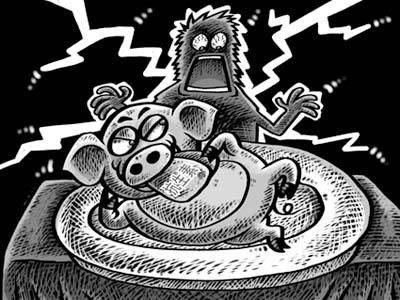(Ecns.cn) – Names such as amoxicillin and aureomycin are typically connected with infections caused by bacteria in humans. In China, however, these antibiotics are also widely overused in animal feed to ensure that livestock grow rapidly and avoid various illnesses before they arrive cooked at your dinner table.
Experts say antibiotic residues left in animal products are invisible time bombs that enter the human body without our knowledge. And when they accumulate to a certain level they can cause pathological changes in the body, resulting in alarming symptoms from allergies to serious intoxication.
According to Xiao Yonghong, a professor at the Institute of Clinical Pharmacology at Peking University, 46.1 percent of the antibiotics – or about 96,800 out of the 210,000 produced in China – are currently used in livestock.
However, the country still does not have a detailed national standard for all the possible components use in animal husbandry products. After the scandal surrounding contaminated dairy, cases involving antibiotics in pork, chicken and fish have once again exposed the problem of insufficient industry and governmental oversight in the world's second largest economy.
Public crisis
Experts have warned that taking antibiotics for common ailments such as a cold is not the best course of action. However, it turns out that we may be unknowingly undermining our immune systems by polluting our bodies with antibiotics through the food we eat.
According to a Wednesday report in Nanfang Daily, a woman named Gong Xiaoming posted a message on her microblog that she was experiencing itchy rashes all over her body, and suspected that the lamb she'd eaten for dinner contained excessive antibiotics.
Immediately, Liao Xinbo, deputy head of Guangdong's health department, responded that Gong's suspicion was not unfounded. He also argued that China could encounter a public health emergency at any time due to the abuse of antibiotics.
That's because antibiotics can accumulate in the bodies of humans who frequently eat contaminated meat, causing bacteria to become resistant to treatment in the event of infection, noted Liao.
It is widely known that antibiotics have already become a panacea in the country's animal husbandry. Whenever a peak season arrives for epidemic diseases, farmers always use larger doses of antibiotics in animal diets to help keep them healthy.
Liao Xinbo revealed that bacterial resistance to some drugs is a very problematic issue, especially for newborns, making it more and more difficult to cure infections. According to an investigation conducted by a hospital in Guangzhou, 70 percent of newborns are found to be resistant to at least one of ten tested anti-bacterial medicines.
Food disaster?
According to a person in charge of a large pig farm, without antibiotics many of the pigs would not survive long enough to be sold, as the cures for some fatal diseases are practically impossible using simple medicine.
The use of antibiotics in pig feed originated in Western countries in the 1940s, and has played an important role in the prevention of bacterial diseases. As China began to adopt a high-density breeding model for pig husbandry about three decades ago, epidemic diseases were a major obstacle to increasing productivity. As a result, Chinese farmers began applying this "panacea" on a large scale, especially after outbreaks of blue ear disease and swine flu.
From this point of view, farmers cannot be blamed for the use of antibiotics in animal husbandry. However, the problem lies in the illicit use of banned drugs, as well in the excessive amount of antibiotics being added to feed.
For instance, olaquindox, a derivative from quindoxin, has been widely used as an animal growth promoter in China. But because it has strong toxic effects that diminish slowly and leave behind more antibiotic residues, China has long prohibited its use. However, many farmers still use it secretly.
Moreover, an antibiotic can only be effective for about two years. After that, most creatures develop a resistance to it. Because antibiotics are upgraded at a rapid pace, it could lead to a disaster to those who regularly consume meat and related products.
Control must be strengthened
Since 2002, China's Ministry of Agriculture, Ministry of Health and the State Food and Drug Administration have released lists of medications that are banned for use in animal husbandry. In 2005, a total of 29 antibiotics were prohibited for use in animal husbandry in a file directory released by the Ministry of Agriculture.
However, the tide of illicit use of antibiotics has continued, largely because the current inspection system does not target antibiotic residues by law. Even if antibiotics are tested for, farmers only receive minor punishments, which does little to prevent illegal behavior.
The government must put more effort into cracking down on the illicit use of antibiotics and introduce trenchant monitoring measures. A possible alternative may be to shift farmers to the use of traditional Chinese medicine, though the curative effects would be slower than antibiotics.
Meanwhile, a lack of veterinary knowledge is also a cause of abuse. As a result, there is a need to better educate farmers in the best practices of animal husbandry, making them more aware of the livestock breeding industry in the future.


















